- Home
- Taylor Caldwell
A Pillar of Iron: A Novel of Ancient Rome
A Pillar of Iron: A Novel of Ancient Rome Read online
EARLY BIRD BOOKS
FRESH EBOOK DEALS, DELIVERED DAILY
LOVE TO READ?
LOVE GREAT SALES?
GET FANTASTIC DEALS ON BESTSELLING EBOOKS
DELIVERED TO YOUR INBOX EVERY DAY!
A Pillar of Iron
A Novel of Ancient Rome
Taylor Caldwell
Dedicated To
The Memory of President John F. Kennedy
and to Senator Barry Goldwater (R. Ariz.)
and Senator Thomas Dodd (D. Conn.)
Power and the law are not synonymous. In truth they are frequently in opposition and irreconcilable. There is God’s Law from which all equitable laws of man emerge and by which men must live if they are not to die in oppression, chaos and despair. Divorced from God’s eternal and immutable Law, established before the founding of the suns, man’s power is evil no matter the noble words with which it is employed or the motives urged when enforcing it.
Men of good will, mindful therefore of the Law laid down by God, will oppose governments whose rule is by men, and, if they wish to survive as a nation they will destroy that government which attempts to adjudicate by the whim or power of venal judges.
—CICERO
In those days the word of the Lord came to me, saying, “Gird up your loins and arise, and speak to Juda all that I command you. Be not afraid in their presence, for I will make you not to fear their countenance. For behold! I have made you this day a fortified city, and a pillar of iron—to the people of the land. And they shall fight against you, and shall not prevail, for I am with you,” says the Lord.
—JER. 1:17-19
PART ONE
The Child and the Youth
PART TWO
The Man and the Lawyer
PART THREE
The Patriot and the Politician
PART FOUR
The Hero
A Biography of Taylor Caldwell
FOREWORD
Any resemblance between the Republics of Rome and the United States of America is purely historical, as is the similarity of ancient Rome to the modern world.
There were many personalities in the great Roman, Marcus Tullius Cicero: the poet; the orator; the lover; the patriot; the politician; the husband and father; the friend; the author; the lawyer; the brother; the son; the moralist; the philosopher. A book could be written about each of these personalities alone. His letters to his publisher and dearest friend, Atticus, fill many books in the Vatican Library, and in other great libraries all over the world. His life as a politician alone would fill a library, and he has been called the Greatest Lawyer of Them All. His own books are voluminous, concerning law, old age, duty, consolation, morals, etc. His family life deserves a novel in itself. Though a skeptical Roman he was also very devout, a mystic and philosopher, and was finally appointed to the Board of Augurs in Rome and was highly regarded by the wise College of Pontiffs. His life as Consul of Rome (similar to the office of President of the United States) would make a thick volume without reference to his office as Senator. His law cases are famous. His Orations constitute many volumes. Patriots for two thousand years have quoted his books concerning man’s duty to his God and his country, notably De Republica. His letters to and from the historian Sallust could fill several books, without referring to anything else. (Vatican Library and other famous libraries.) A bibliography is included at the end of this book.
His letters to Julius Caesar reveal his conciliatory and affable nature, his humor and sometimes his irascibility, and his awareness of Julius Caesar’s own antic, subtle, light-hearted, and powerful temperament, not to mention his deviousness. Though so different in natures they were, as Julius Caesar once said, “like the Gemini.” Julius rarely deceived him—though he tried! “I trust only you in Rome,” Julius once said. They loved each other in their own individual way—with caution, wariness, laughter, anger, and devotion. Their association is a fascinating subject.
The dearest and most devoted friend of Cicero was his editor and publisher, Atticus, and their correspondence, covering thousands of letters over a long lifetime, is touching, revealing, tender, despairing, and vexatious. Atticus frequently wrote that Cicero would not be appreciated in his lifetime, “but ages yet unborn will be the recipients of your wisdom, and all that you have said and written will be a warning to nations yet unknown.” Cicero’s visions, hundreds of them, of the terrible future—which we now face ourselves in the modern world—are related in his letters to Atticus. He was deeply involved in Judean theology and philosophy, and was well acquainted with the prophets and particularly with the prophecies of the Messias-to-come, and was a worshiper of the Unknown God. He longed to see the Incarnation, prophesied by King David and Isaias and other of the mighty Israelite prophets, and his vision of the end of the world, contained in the first and second chapters of Joel (King James Version) and Sophonias, (Douay-Challoner Version) is recorded in one of his letters to Atticus (Vatican Library) and certainly describes the world in a nuclear holocaust. His last letter, just before his death, to Atticus, is most moving, as he relates his dream of the vision of God’s Hand.
Cicero was particularly struck by the fact that in all religions, including the Indu and the Greek and the Egyptian and the Israelite, there is the prophecy of the Messias and the Incarnation of God as man. He was so fascinated, and so hopeful, that many of his letters include speculation on the Event. He desired, above all things, to be alive when it occurred. His Jewish friend (whose name he does not mention, but to whom I have given the name of Noë ben Joel) is frequently spoken of in his letters to various friends, and he was much drawn to the famous Jewish-Roman actor, and father of the modern theatre, Roscius, about whom another book could be written.
He hated and feared militarism and was a man of peace in a world that did not contain peace and never will. His relations with the great soldier, Pompey, are very troubled, for he suspected Pompey’s militarism but honored his conservatism—and brought about his own exile when Caesar marched on Rome. Caesar, though a patrician and a soldier, himself, belonged to the populares (popular) party, and claimed to be a great democrat and a lover of the masses, whereas he and Cicero well understood that he despised them. Cicero, as a middle-class (“new”) man, was at odds with this prevaricating and hypocritical attitude of “my dear young friend, Julius,” who thought his own hypocrisy very amusing. Cicero, himself, was never a hypocrite; at all times he was a “moderate,” the man of the middle way, a believer in the intrinsic honor and decency of the common man, a man who loved freedom and justice and mercy and kindness. It was inevitable, then, that he should be assassinated. Never did he run to the extreme of deifying the average man, or denigrating him. He merely accepted him and was compassionate concerning him, and fought for his rights and freedom.
Cicero’s strongest worldly devotion was to the Constitution of Rome and especially its Bill of Rights—both eerily similar to our own. For this he suffered calumny in a Roman world which had begun to respect neither—and this too is only too familiar in America to all of us. He suspected the capriciousness of judges, however, and was always fighting them in the courts when representing a client. To him rule by law was an Edict of God, based on the natural laws of God, and rule by men was most terribly to be feared in a nation. He lived to see the latter come to pass in the Roman Republic, and tyranny to result.
His orations against Lucius Sergius Catilina (sometimes called Catiline in English translations) could be used by freedom-loving politicians today, for they are extremely modern. Catilina’s own addresses, and incitings of the people are not this author’s inventions. Sallust records them, and if they appear contempor
ary it is not the author’s doing! Cicero has often been referred to “as the first real American,” and Catilina to various politicians sadly extant, and in the near past.
The histories of the Roman Republic and the United States of America are oddly parallel, such as Cincinnatus, “the father of his country,” strangely like George Washington. Present politicians may find many of their private images in Catilina, and many of their secret desires. Were Cicero alive in the America of today he would be aghast and appalled. He would find it so familiar.
The Pax Romana, conceived in a spirit of peace and conciliation and world law, is mysteriously like the United Nations of today. The rest is mutual history, including foreign aid and recalcitrant nations, and disintegration due to the fact that so many nations disregarded the spirit of the Charter of the Pax Romana just as they disregard the spirit of the Charter of the United Nations now. I have drawn no overt resemblance between the Pax Romana and the United Nations. Where such an overpowering and sobering resemblance occurs it is a matter of recorded history. For, as Cicero said, and Aristotle first of all, “those nations who ignore history are doomed to repeat its tragedies.”
The Romans were meticulous historians and recorded events to the very hour they occurred. Therefore, if readers are struck by the weird similarities of Rome and America they need only to study Roman history for themselves. I have spent nine years on the writing of this book and have been as objective as it is possible for a human being to be. I intrude none of my own opinions. I merely present Marcus Tullius Cicero and his world for the reader’s own judgment and conclusions.
This book was dedicated to John F. Kennedy before his assassination—so similar in many ways to Cicero’s—and we had some correspondence on the matter, and the letters will eventually be given to the Kennedy Library. It is now dedicated to his memory in sorrow and in sadness.
Cicero was a human being, as well as a politician and a lawyer and an orator. It is in the nature of man to desire that his heroes be perfect, and that is laudable if unrealistic. So Cicero is shown in this book as a man, with his own peculiarities which he shares with all men, and not as a shining marble image. He suffered fearfully from the natural irresolution and confusions present in a temperate man of much moderation, who thought that other men should be reasonably civilized, and rational. He never recovered from being a rational man in a most irrational world, and this too is the fate of all moderates.
While hundreds of histories about Cicero, Caesar, Mark Antony, Crassus, Clodius, Catilina, et. al., are available in libraries in English and many other languages, and thousands of writers quote Cicero’s letters, and thousands of politicians, I translated many hundreds of letters to-and-from Cicero and his editor and publisher, Atticus, myself in the Vatican Library in April 1947, and many more from Cicero to his brother, wife, son, daughter, Caesar, Pompey, and other people, in 1962 while again in Rome, and in Greece.
The work on this book by both myself and my husband was begun in 1947, and is contained in hundreds of typed notes and in thirty-eight notebooks. Long before a book is actually written—and the actual writing began in 1956—notes are made and put in order, translations done and comments prepared. Any book is like the one-seventh of an iceberg which appears above the surface of the sea. The other six-sevenths lie below the surface in the shape of preparation, notes, bibliography, constant study, translation, coordination, and endless thought, and, of course, perpetual checking of sources, and in the visiting of scenes pertaining to the background of any historical novel. We spent many days among the ruins of ancient Rome, consulted many authorities in Rome, in order to know the exact position of the various temples and other buildings mentioned in accounts of the Forum. We also studied, in Roman libraries, ancient Roman authorities as to the physical appearance of the great city at the time of Cicero. All this was in the interest of authenticity. The description of the Acropolis of Athens and in particular the description of the majestic Parthenon are authentic, for not only did we spend many days among the ruins but consulted archeologists in Greece when we were guests of the Greek government in 1962. (Particular thanks are due to the Minister of Culture in Athens for his kind assistance.)
As few footnotes as possible have been used, but in every place where it is written, “Cicero wrote—Atticus wrote—etc.,” the letters are authentic and can be found in many histories in libraries almost everywhere. It is Cicero the patriot, the lover of Constitutional Law and the Bill of Rights, who should command our admiration and deep reflection today. He was attacked as a “reactionary” and also as a “radical,” depending on who was attacking him or in whose path he stood. He was maligned as “living in the past in these modern, dynamic days” and he was equally maligned as “violating points of law and using abusive methods.” He was “against progress” to some, and an extreme “conservative” to others. (If these terms seem depressively familiar to readers, it is the fault of history and man’s nature, which never change.) But Cicero stood always on the middle way, which made for him violent and relentless enemies among ambitious men.
The statement that the Romans had a daily newspaper which was often used as a propaganda broadcast is not an anachronism. They actually had three competing newspapers at the time of Cicero, but the Acta Diurna was the favorite. They even had columnists, of whom Julius Caesar was a prime example. They had cartoonists—very witty fellows in their own estimation, and satirists, and carried news of the latest Stock Market dealings, and libelous gossip.
Cicero’s speeches and letters are as freshly modern for today as they were pertinent to Romans two thousand years ago, and as momentous as our daily newspapers and carried similar events.
Sic transit Roma! Sic transit America? Let us pray not, or we shall drag down our world with us as Rome dragged down hers, and another long night of the Dark Ages will face us. But when, as Aristotle mourned, did men ever learn from history? Ostende nobis, Domine, misericordiam tuam, et salutare tuum da nobis.
TAYLOR CALDWELL
PART ONE
The Child and the Youth
Os justi meditabitur sapientiam, et lingua ejus loquetur judicium; lex Dei ejus in corde ipsius!
CHAPTER ONE
Marcus Tullius Cicero winced when the hot plaster was placed on his chest by his physician, and in the somewhat pettish voice of a semi-invalid he demanded, “What is that stink?”
“Vulture’s grease,” said the physician, proudly. “Two sesterces a pot and guaranteed to allay any inflammation.” Slaves stirred up the coals in the brazier and M. Tullius shivered under his blankets. A fur rug had been placed over his feet but he was still cold.
“Two sesterces,” he repeated with gloom. “What did the Lady Helvia say about that?”
“She does not as yet know,” said the physician. M. Tullius smiled with anticipation. “The money will go on the household accounts,” he said. “It is an excellent thing to have a thrifty wife in these profligate days, but not always, when such a thing as this vile unguent is added to the cost of beans and kitchen utensils. I thought we had a medical account.”
“I bought the grease from another physician,” said the physician with some small rebuke in his voice. “The Lady Helvia will not deal with merchants if she can avoid it. Had I bought this in the shops the price would have been five sesterces, not two.”
“Nevertheless, the two sesterces will go on the household accounts,” said M. Tullius. “The cost of the linen and wool for the expected child will also appear among the kettles and the fish and the flour. Yes, a frugal wife is excellent, but in some way, as a husband, I resent being numbered between new chamber pots and goat cheese. I saw it for myself.” He coughed heavily and the physician was pleased. “Aha, the cough is much looser,” he said.
“There are times,” said M. Tullius, “when a patient, in order to save his life, must hasten to get well and escape his physician’s ministrations and his stinks. It is a matter of self-preservation. What is the weather today?”
“Very bad, and most unusual,” said the physician. “We had a snowstorm. The hills and pastures are deep in it, and the river is frozen. But the sky is blue and clear and fresh, and there is a brisk wind from the north. This will be helpful in your cure, Master. It is the east wind we fear, and especially the southeast wind.”
M. Tullius was beginning to feel warmer, not with the heat of fever but with returning health. The woolen shift he wore began to prickle; he moved, and the stench of the vulture’s grease became very powerful. He hastily pulled the blanket over his chest again. “It is a moot point,” he said, “whether I shall be asphyxiated by the stink or by the congestion in my lungs. I think I prefer the latter.” He coughed tentatively. The pain in his chest was subsiding somewhat. He looked about his bedroom, and saw the slaves industriously heaping the brazier with more wood. The thick glass of the window was dripping with moisture. “Enough,” he said, irritably. “I am beginning to drown in my sweat.”
By nature he was not an irritable man, but kindly and very gentle, and always somewhat abstracted. The physician was encouraged by this irritability; his patient would soon be well. He looked at the thin dark face on the white pillows, and at the large brown eyes which always failed, in spite of efforts, to appear stern. His features were mild and clear, his brow benevolent, his chin undetermined. He was a young man, and he seemed younger than his years, which annoyed him. He had the calm and somewhat passive hands of the scholar. His fine brown hair did not take to cropping amiably; it merely lay on his long skull as if painted there and could never be induced to stand upright in the manner of a very virile man.
He heard footsteps and winced again. His father was approaching the bedroom, and his father was an “old” Roman. He closed his eyes and pretended to fall asleep. He loved his father but found him overpowering, with all his tales of the grandeur of the family, a grandeur Tullius sometimes suspected did not exist. The footsteps were firm and heavy and the father, also named M. Tullius Cicero, entered. “Well, Marcus,” said the loud and hectoring voice, “when are we arising?”

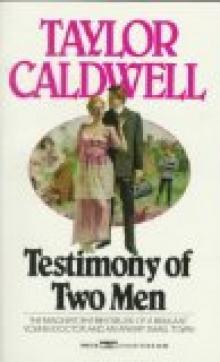 Testimony of Two Men
Testimony of Two Men Wicked Angel
Wicked Angel The Arm and the Darkness
The Arm and the Darkness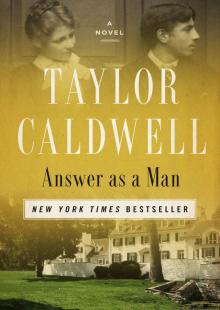 Answer as a Man
Answer as a Man Grandmother and the Priests
Grandmother and the Priests On Growing Up Tough: An Irreverent Memoir
On Growing Up Tough: An Irreverent Memoir Ceremony of the Innocent
Ceremony of the Innocent The Listener
The Listener Bright Flows the River
Bright Flows the River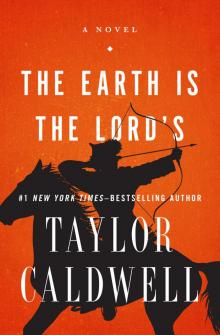 The Earth Is the Lord's
The Earth Is the Lord's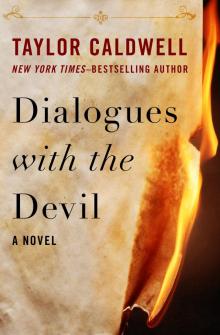 Dialogues With the Devil
Dialogues With the Devil A Tender Victory
A Tender Victory This Side of Innocence
This Side of Innocence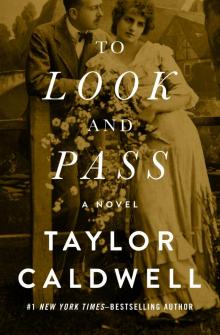 To Look and Pass
To Look and Pass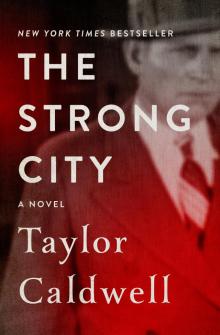 The Strong City
The Strong City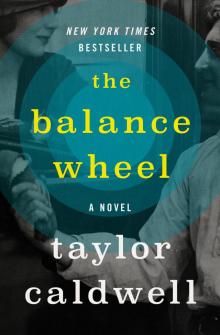 Balance Wheel
Balance Wheel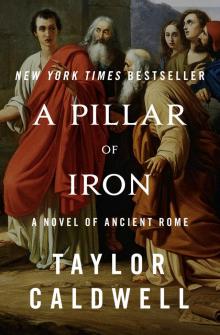 A Pillar of Iron: A Novel of Ancient Rome
A Pillar of Iron: A Novel of Ancient Rome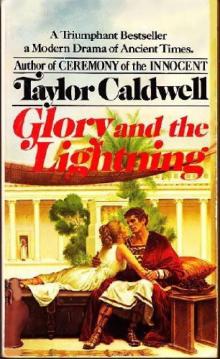 Glory and the Lightning
Glory and the Lightning Dear and Glorious Physician
Dear and Glorious Physician The Wide House
The Wide House The Final Hour
The Final Hour Never Victorious, Never Defeated
Never Victorious, Never Defeated Unto All Men
Unto All Men The Turnbulls
The Turnbulls Your Sins and Mine: The Terrifying Fable of a World Without Faith
Your Sins and Mine: The Terrifying Fable of a World Without Faith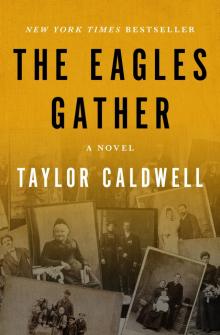 The Eagles Gather
The Eagles Gather Let Love Come Last
Let Love Come Last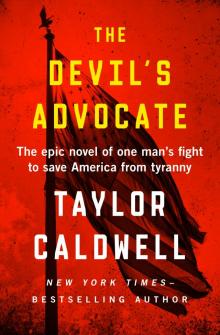 The Devil's Advocate: The Epic Novel of One Man's Fight to Save America From Tyranny
The Devil's Advocate: The Epic Novel of One Man's Fight to Save America From Tyranny A Prologue to Love
A Prologue to Love Maggie: Her Marriage
Maggie: Her Marriage The Late Clara Beame
The Late Clara Beame Melissa
Melissa Great Lion of God
Great Lion of God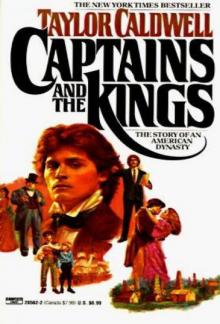 Captains and the Kings
Captains and the Kings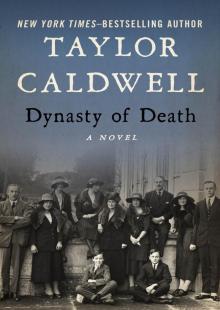 Dynasty of Death
Dynasty of Death No One Hears but Him
No One Hears but Him The Sound of Thunder
The Sound of Thunder There Was a Time
There Was a Time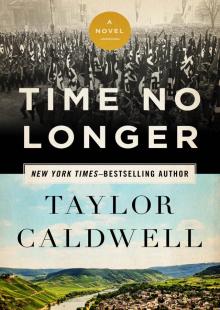 Time No Longer
Time No Longer I, Judas
I, Judas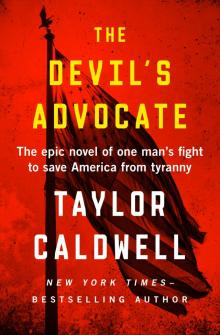 The Devil's Advocate
The Devil's Advocate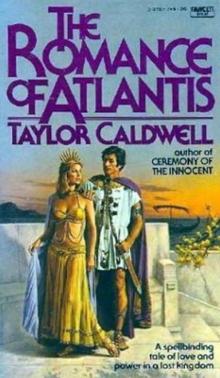 The Romance of Atlantis
The Romance of Atlantis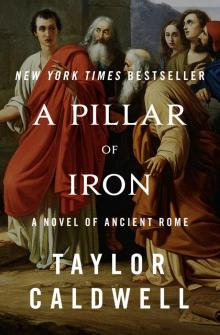 A Pillar of Iron
A Pillar of Iron On Growing Up Tough
On Growing Up Tough Your Sins and Mine
Your Sins and Mine